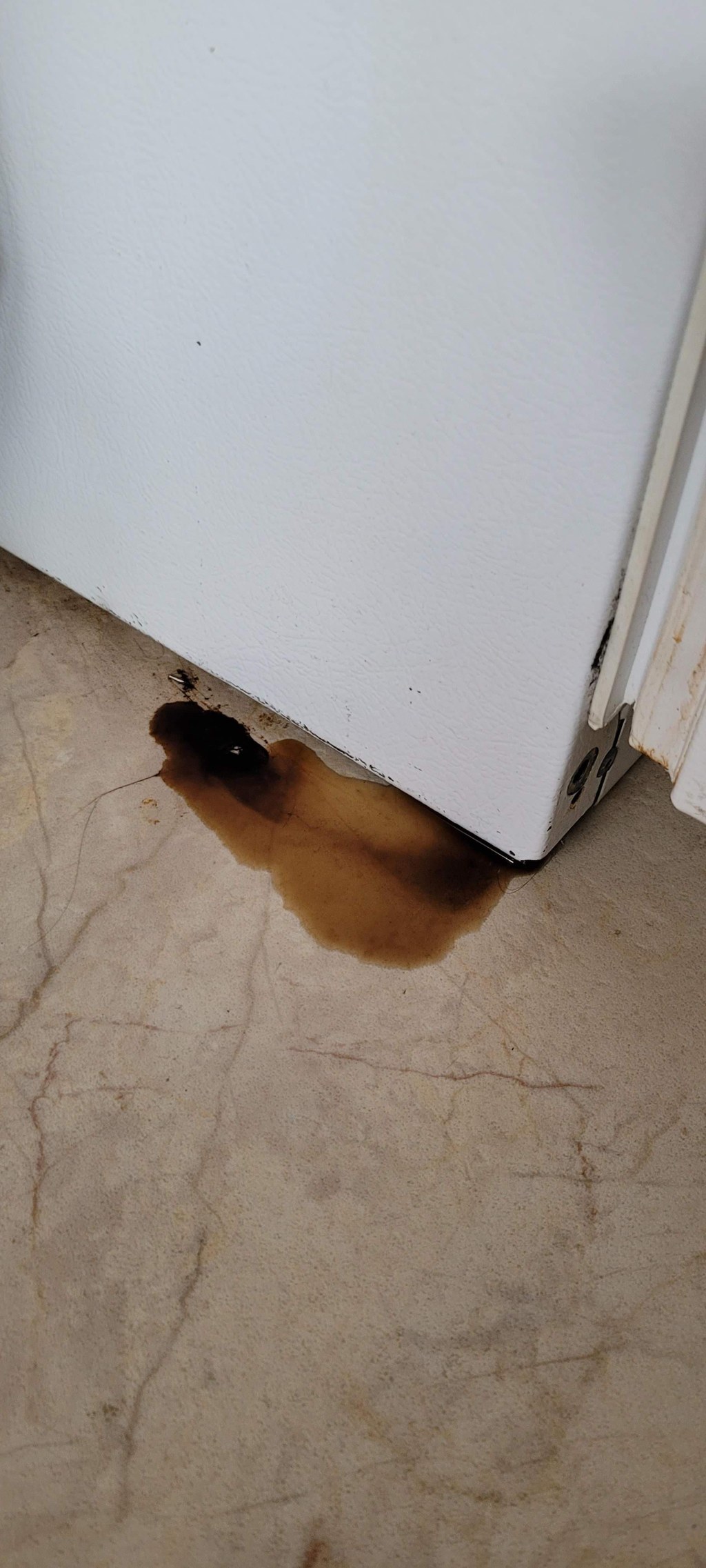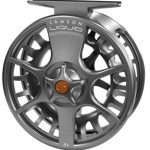Stop The Mess: Brown Liquid Leaking From Refrigerator? Discover The Solution Now!
Brown Liquid Leaking from Refrigerator: Causes, Solutions, and Prevention
Table of Contents
1. Introduction
1 Picture Gallery: Stop The Mess: Brown Liquid Leaking From Refrigerator? Discover The Solution Now!

2. What Causes Brown Liquid Leaking from Refrigerator?
3. Who is Affected by Brown Liquid Leaking from Refrigerator?
4. When Does Brown Liquid Leaking from Refrigerator Occur?
Image Source: applianceblog.com
5. Where Does Brown Liquid Leaking from Refrigerator Come From?
6. Why is Brown Liquid Leaking from Refrigerator a Concern?
7. How to Deal with Brown Liquid Leaking from Refrigerator?
8. Advantages and Disadvantages of Brown Liquid Leaking from Refrigerator

Image Source: redd.it
9. Frequently Asked Questions (FAQs)
10. Conclusion
11. Final Remarks
1. Introduction
Dear Readers,
Welcome to our informative article about brown liquid leaking from refrigerators. We understand that dealing with unexpected issues like this can be frustrating and inconvenient. Therefore, we have created this comprehensive guide to help you understand the causes, find effective solutions, and prevent further occurrences of brown liquid leaks in your refrigerator.
In this article, we will provide an overview of the phenomenon, discuss the potential causes, explore who may be affected, examine the timing and location of leaks, address the reasons for concern, and offer practical advice on how to deal with the issue. Additionally, we will present the advantages and disadvantages of brown liquid leaks, answer frequently asked questions, and conclude with a summary of the key points.
We hope that this article will equip you with the knowledge and confidence to address brown liquid leaks from your refrigerator effectively. So, let’s dive in and discover everything you need to know!
2. What Causes Brown Liquid Leaking from Refrigerator?
One of the common causes of brown liquid leaking from a refrigerator is a clogged condensation drain. Over time, dust, dirt, and food particles can accumulate in the drain and form a blockage. This causes water to back up and leak out of the refrigerator, resulting in a brown liquid.
Another possible cause is a malfunctioning freezer defrost system. If the defrost heater or the defrost thermostat fails, ice can build up in the freezer and melt, causing water to leak onto the refrigerator shelves and eventually turn brown.
Furthermore, a cracked or damaged water supply line can also lead to brown liquid leaks. If the water supply line that feeds the ice maker or water dispenser is compromised, it can result in the leakage of brown-colored water.
It is essential to identify the specific cause of the brown liquid leak in order to implement the appropriate solution. Consulting a professional technician or referring to the refrigerator’s manual can help in diagnosing the issue accurately.
3. Who is Affected by Brown Liquid Leaking from Refrigerator?
Brown liquid leaks from refrigerators can affect anyone who owns a refrigerator with the potential for such leaks. Whether you are a homeowner, tenant, or business owner, if your refrigerator experiences this problem, it is crucial to address it promptly. Ignoring the issue can lead to further damage to the refrigerator and the surrounding area, potentially resulting in mold growth and unpleasant odors.
Additionally, if you have young children or pets at home, it is essential to resolve the issue promptly to ensure their safety. Brown liquid leaks can pose slipping hazards and may contain contaminants that can be harmful if ingested.
Therefore, it is recommended for everyone who owns a refrigerator to be aware of the potential causes, solutions, and prevention methods related to brown liquid leaks.
4. When Does Brown Liquid Leaking from Refrigerator Occur?
Brown liquid leaks from refrigerators can occur at any time, but they are typically more common during warmer months or when the refrigerator is subjected to increased usage, such as during holidays or large gatherings.
These leaks can also happen when there is a sudden temperature change or power interruption that affects the refrigerator’s cooling system. The resulting condensation can mix with other substances inside the refrigerator, leading to the formation of brown liquid.
It is crucial to pay attention to any signs of leakage and address them promptly to prevent further damage to the refrigerator and its surroundings.
5. Where Does Brown Liquid Leaking from Refrigerator Come From?
The brown liquid leaking from a refrigerator can come from different sources depending on the specific cause of the issue.
If the leak is due to a clogged condensation drain, the liquid originates from the condensation that forms inside the refrigerator. The drain is responsible for directing this excess moisture out of the refrigerator. However, when the drain is clogged, the liquid accumulates and eventually leaks out, turning brown due to the presence of dust and other contaminants.
In the case of a malfunctioning freezer defrost system, the brown liquid comes from the melted ice that should have been properly drained away. Instead, it leaks onto the refrigerator shelves, resulting in the brown-colored liquid.
When a water supply line is cracked or damaged, the brown liquid leaking from the refrigerator comes from the water source. The coloration occurs due to the presence of rust or other impurities in the water system.
Understanding the source of the brown liquid is essential for effectively resolving the issue and preventing its recurrence.
6. Why is Brown Liquid Leaking from Refrigerator a Concern?
Brown liquid leaks from refrigerators are a cause for concern due to several reasons:
1. Property damage: The leaked liquid can damage the interior of the refrigerator, surrounding cabinets, and flooring. If left unaddressed, it can lead to costly repairs or replacements.
2. Mold growth: Moisture from the leaks can create an ideal environment for mold to grow. Mold can be harmful to health, causing respiratory issues and allergies.
3. Odors: The combination of moisture and food particles can result in unpleasant smells emanating from the refrigerator.
4. Safety hazards: The leaked liquid can create slippery surfaces, increasing the risk of slips and falls. Additionally, if the liquid contains contaminants, it can be harmful if accidentally ingested.
These concerns highlight the importance of promptly addressing brown liquid leaks from refrigerators to ensure the safety of the household and maintain the longevity of the appliance.
7. How to Deal with Brown Liquid Leaking from Refrigerator?
Dealing with brown liquid leaks from refrigerators involves a multi-step process:
1. Identify the cause: Determine the specific reason behind the brown liquid leakage. This could be a clogged condensation drain, a malfunctioning defrost system, or a damaged water supply line.
2. Shut off the water supply: If the leak is due to a damaged water supply line, locate the shut-off valve and turn off the water supply to prevent further leakage.
3. Clean the affected areas: Remove all food items and shelves from the refrigerator and clean the interior using a mild detergent and warm water. Wipe dry thoroughly.
4. Unclog the condensation drain: If the leak is caused by a clogged condensation drain, use a pipe cleaner or a mixture of vinegar and baking soda to clear the blockage.
5. Repair or replace faulty components: If the issue lies in the defrost system or the water supply line, consult a professional technician to repair or replace the malfunctioning parts.
6. Prevent future leaks: Regularly inspect and clean the condensation drain, ensure the defrost system is functioning correctly, and inspect the water supply line for any signs of damage or wear. Taking preventive measures can help avoid future brown liquid leaks.
By following these steps, you can effectively address brown liquid leaks from your refrigerator and ensure its proper functioning.
8. Advantages and Disadvantages of Brown Liquid Leaking from Refrigerator
Like any issue, brown liquid leaks from refrigerators have both advantages and disadvantages that should be considered:
Advantages:
1. Early detection of potential problems: Brown liquid leaks can serve as an early warning sign of underlying issues within the refrigerator’s internal systems, allowing for timely repairs and preventive measures.
2. Prompt action: Dealing with a brown liquid leak necessitates immediate action, which can foster quick thinking and problem-solving skills.
Disadvantages:
1. Property damage: Brown liquid leaks can cause damage to the refrigerator and surrounding areas, resulting in financial losses.
2. Inconvenience: Having to address a brown liquid leak can be inconvenient and time-consuming, especially if repairs or replacements are required.
It is crucial to weigh the advantages and disadvantages when facing a brown liquid leak and take the necessary steps to mitigate any negative consequences.
9. Frequently Asked Questions (FAQs)
1. Q: Can a brown liquid leak from a refrigerator be harmful?
A: While not directly harmful, the contaminants present in the brown liquid can pose health risks if accidentally ingested. It is essential to promptly clean up any leaks and ensure the liquid does not come into contact with food or utensils.
2. Q: Do all refrigerators experience brown liquid leaks?
A: No, not all refrigerators will experience brown liquid leaks. However, it is important to monitor for any signs of leakage and address them promptly to prevent further damage.
3. Q: Can I repair a brown liquid leak myself?
A: While some minor issues can be resolved by homeowners, it is advisable to consult a professional technician for accurate diagnosis and proper repairs, especially if the problem involves complex components or requires specialized knowledge.
4. Q: How can I prevent brown liquid leaks from occurring in the future?
A: Regularly clean the condensation drain, ensure the defrost system is functioning correctly, and inspect the water supply line for any signs of damage. Additionally, following the manufacturer’s maintenance guidelines and scheduling regular professional inspections can help prevent future leaks.
5. Q: Can a brown liquid leak be fixed without replacing the refrigerator?
A: In many cases, brown liquid leaks can be resolved without replacing the entire refrigerator. By identifying the specific cause of the leak and addressing it promptly, repairs can be made to restore the appliance’s functionality.
10. Conclusion
In conclusion, brown liquid leaks from refrigerators can be a frustrating and concerning issue. By understanding the causes, being aware of the potential risks, and knowing how to deal with the problem effectively, you can resolve the issue and prevent future occurrences.
Remember to identify the specific cause of the brown liquid leak, clean the affected areas, and repair or replace faulty components as necessary. Regular maintenance and preventive measures can help ensure the proper functioning of your refrigerator.
Thank you for reading our comprehensive guide on brown liquid leaking from refrigerators. We hope you found this information valuable, and we wish you success in addressing any brown liquid leaks you may encounter.
11. Final Remarks
Dear Readers,
We would like to remind you that the information provided in this article is intended for educational purposes only. While we have taken great care to ensure the accuracy and reliability of the content, we cannot guarantee its completeness or applicability to your specific situation.
If you encounter a brown liquid leak from your refrigerator, we recommend consulting a professional technician or referring to the refrigerator’s manual for guidance. They will be able to provide you with the most accurate and tailored advice based on your specific circumstances.
Thank you once again for choosing our guide as a source of valuable information. If you have any further questions or concerns, please feel free to reach out to us.
This post topic: Liquid
![skin concerns] is it bad not to moisturize? Top photo is when I](https://saveyourhealths.info/wp-content/uploads/2023/07/skin-concerns-is-it-bad-not-to-moisturize-top-photo-is-when-i-150x150.jpg)

